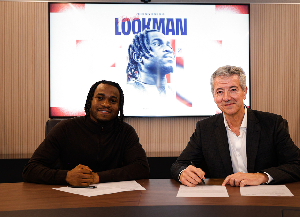Tema (Greater Accra), 28th June 99 --
The Centre for Policy Analysis (CEPA) has commended the "strong independence" of the Bank of Ghana (BOG) which it says now enables it to dishonour government cheques which are likely to cause monetary problems.
CEPA said the BOG has since 1998 shed its "previous image of a passive institution", which accommodated fiscal excesses, and become a strong supervisory authority with a lot of clout over monetary, exchange rates and fiscal developments in the country.
Dr J. L. S. Abbey, Executive Director of CEPA, made the commendation in a speech read on his behalf by Dr Nii Kwaku Sowah, Core Research Fellow of the Centre, at the Presidential Ball of the Rotary Club of Tema on Saturday night.
He said this strong position of the central bank was ensured by the governor of the BOG having to chair the implementation committee of Ghana's Enhanced Structural Adjustment Facility (ESAF) programme with the IMF.
For the first time since the Economic Recovery Programme (ERP) was initiated in 1983, the governor of the central bank, and not the Finance Minister, was given the task of ensuring that all financial targets within the stabilisation programme are met.
Dr Abbey said the resulting economic achievements for last year included a monetary growth of less than 18 percent over the period, an exchange rate depreciation of less than five percent, and a decline in the rate of inflation.
He said these targets were achieved by the strong enforcement of laws relating to banking and the use of foreign currency, prudent use of repurchase agreements in monetary management and by placing a limit on excessive budgetary spending by government.
Dr Abbey said until quite recently, the BOG operated as a "weak appendage" of the Ministry of Finance, and that made it difficult for the bank to come out with its independent policies to counteract fiscal policies of the Ministry.
The 1992 Constitution granted the governor quasi-independence by giving him a "full term of office", which exceeded that of a government in power. Yet through the generous accommodation of (its) excessive spending, the government fuelled inflationary spiral in the country.
Dr Abbey applauded this "new independence of the central bank", describing it as "par supreme" but cautioned that the passivity of the bank should not be transferred to the Ministry.
Dr Abbey noted that Ghana's economic woes are basically rooted in poor fiscal management, dictated by intense socio-political demand pressures in the face of serious resource constraints. The result is reflected in chronic and large budget deficits.
He called for discipline from within and painstaking hard choices by major decision makers, particularly the Executive and Parliament, to tackle the perennial large budget deficits.
He cautioned that if the central bank is always left with no other option than to dishonour government cheques, important developments in the country may suffer.
Dr Abbey advised that fiscal policy must be prudent enough to allow for the creation of jobs and improved standard of living. This should be complemented by monetary policy to maintain a stable price regime to make the country internationally competitive.
At the ball, Mr Seth Quao, out-going president, handed over to a new executive and board members. The new president is Dr. Kwesi Aidoo of Tema Oil Refinery.
The occasion was also used to honour three journalists and their various organisations for their "commendable roles" in reporting service projects and activities of the Club, and educating the public about Rotary's aims and accomplishments.
They are Mr George Osei-Antwi, Tema Municipal Manager of the Ghana News Agency, Miss Kate Hudson, Tema correspondent of the "Daily Graphic", and Miss Rebecca Ekpe, Ghana Broadcasting Corporation (GBC) radio correspondent.
The Volta Aluminium Company (VALCO), which freighted several containers of books donated by the Brothers' Brother Foundation of the United States for the Club free of charge, was decorated with the Paul Harris Award, the highest award of the Rotary Club.
The books, worth over eight billion cedis, were distributed to the three medical schools in the country, 38 nursing and midwifery schools, the universities, and a number of junior and senior secondary schools.
Mr Quao said the Rotary Club of Folksten, UK has promised to fund the furniture component of 6,000 dollars for a 400 million-cedi Rehabilitation Centre for the Disabled being built by the Rotary Club of Tema.
GRi?/
Business News of Monday, 28 June 1999
Source: --












